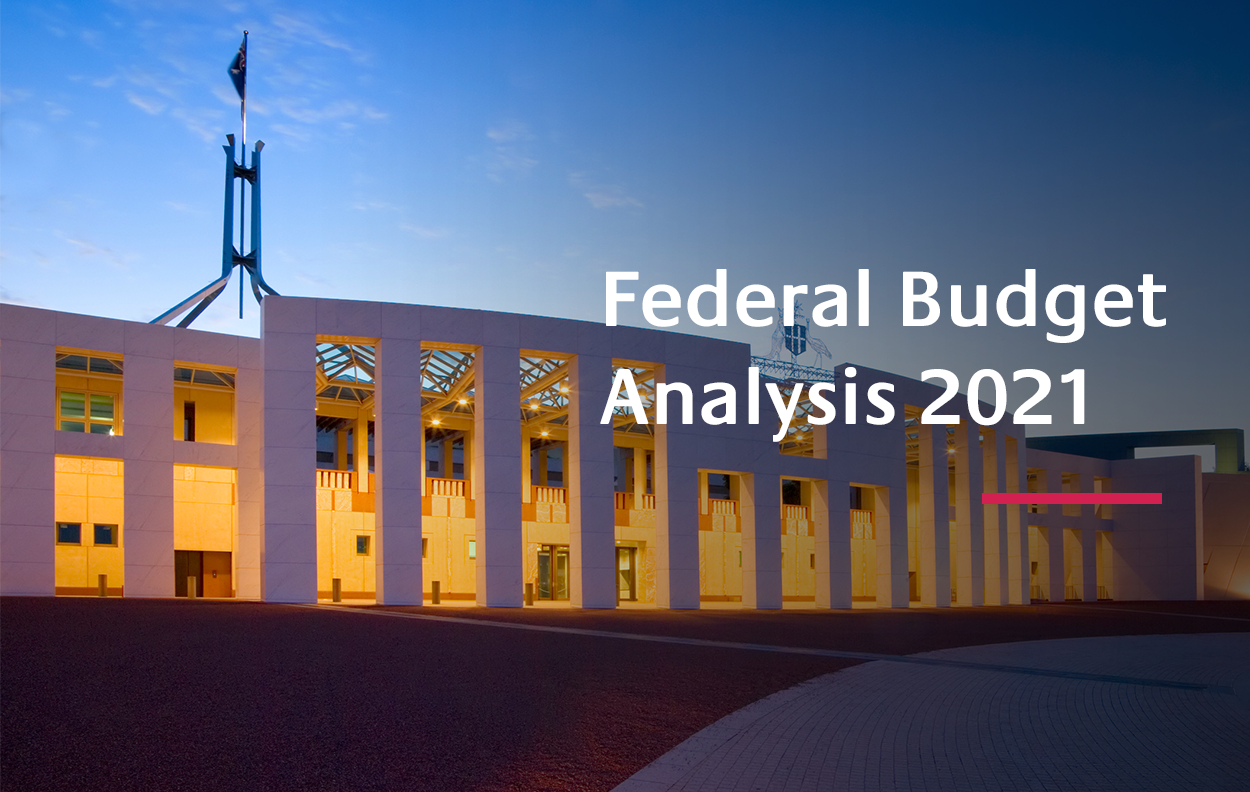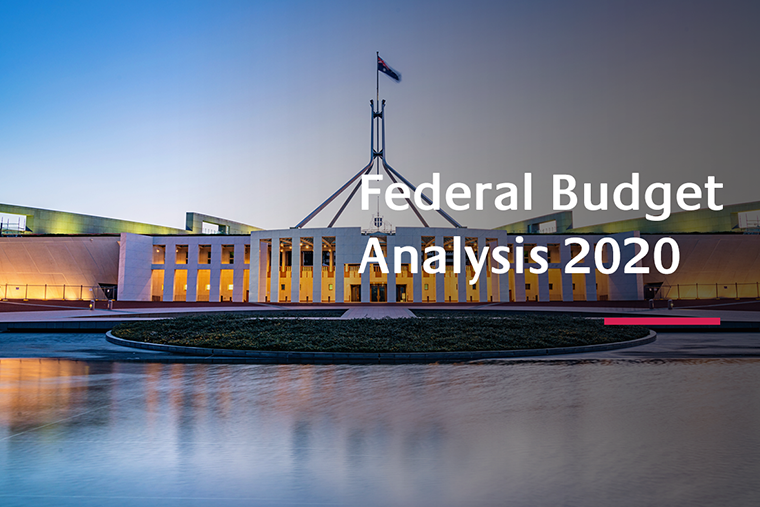In handing down his third Federal Budget, the Treasurer, Josh Frydenberg reminded us that Australia has “outperformed all other major economies around the world during the coronavirus pandemic” and it’s “not the result of luck”.
Mr Frydenberg said the 2021-22 Budget is about securing Australia’s economic recovery. Record funding and big spending plans have been outlined with the primary aim of creating jobs and keeping unemployment low.
There are many winners. With aged care, childcare, mental health and women amongst the biggest recipients of the spending plans.
Read our analysis of the key points for businesses, individuals and families below.
Businesses
Temporary Full Expensing and Temporary Loss Carry-back to Continue - Two measures introduced in the 2020-21 budget, temporary full expensing and temporary loss carry-back, are set to extend by one year until 30 June 2023. Combined the extension of these two measures are set to deliver an estimated $20.7 billion in tax relief to businesses.
Temporary full expensing allows eligible businesses with aggregated annual turnover of up to $5 billion to deduct the full cost of eligible depreciating assets.
Temporary loss carry-back will also be extended by one year. This will allow eligible companies to carry-back tax losses from the 2022-23 income year to offset previously taxed profits as far back as the 2018-19 income year.
Good news for Small Beer Brewers and Distillers - A boost in the excise rebate aimed at craft breweries and small distilleries is designed to bring the excise concession into line with the Wine Equalisation Tax and provided an estimated $225 million in tax relief.
From 1 July 2021, eligible brewers and distillers will be able to claim a refund on any excise they pay up to an annual cap of $350,000. Currently, they are entitled to a rebate of 60% of the excise they pay, up to an annual cap of $100,000.
Only granted patents, which were applied for after the Budget announcement, will be eligible.
The patent box encourages businesses to undertake their R&D in Australia and keep patents here.
An Innovation Funding Pool will also be established for non-GP medical specialist training to fund innovative activities and the continued professional development for rural medical specialist trainees.
Independent Body to Assist with Debt Recovery Actions from Small and Family Businesses - Currently, small businesses are only able to pause or modify ATO debt recovery actions through the court system, which can be costly and time consuming.
The changes will allow the Small Business Taxation Division of the AAT to pause or modify any ATO debt recovery actions, such as garnishee notices and the recovery of General Interest Charge or related penalties until the underlying dispute is resolved by the AAT.
Small business entities (including individuals carrying on a business) with an aggregated turnover of less than $10 million per year will be eligible to use this streamlined approach.
Changes to Employee Share Schemes - With an aim to encourage the use of employee share schemes, which the government claims are critical for start-ups to attract global talent, tax changes will be made.
The ‘cessation of employment’ taxing point for tax-deferred Employee Share Schemes (ESS) will be removed.
By removing the cessation of employment taxing point, the measure will result in tax being deferred until the earliest of the remaining taxing points:
Digital infrastructure Spending - The Government will provide $1.2 billion for the Digital Economy Strategy, to support Australia to be a leading digital economy and society by 2030. The Digital Economy Strategy is about investing in the settings, infrastructure and incentives to grow Australia’s digital economy to ensure businesses across all sectors are able to lift productivity and be globally competitive.
It includes:
The Wage Subsidy for Apprentices to be Extended - The Boosting Apprenticeship Commencements (BAC) wage subsidy will be extended for a further six months to support new apprentices and trainees who commence by 31 March 2022.
This additional $1.5 billion investment will support the employment of newly commencing apprentices and trainees, assisting school leavers and job seekers during the peak hiring period for key industries.
The subsidy will be paid to employers for a full 12 months from commencement. The BAC extension will help support women by delivering 5,000 additional gateway services and guaranteeing in-training support services for women commencing in a non-traditional trade occupations.
Individuals and families
Low- and Middle-Income Earner Tax Cuts - The low and middle-income tax offset that applies to workers earning less than $126,000 will be extended at a cost of $7 billion. It is currently due to expire after July 1, 2021.
The Government said around 10.2 million individuals will benefit from retaining the offset in 2021-22, which is worth up to $1,080 for individuals or $2,160 for dual income couples. Sold as “new” tax cuts, the temporary extension will be refunded when workers lodge their tax returns which means the money will flow for millions of workers from July.
Commencing 1 July 2021, Single parents with household income of $125,000 or less will be able to buy a home with just a 2% deposit or just $8000, under a government-guaranteed home loan scheme to help women who are marginalised from the property market. The government expects the main beneficiaries of the scheme to be single mothers who represent 80% of this group.
Expansion of JobSeeker and JobTrainer programs - The JobTrainer program will be extended for another year, offering free and low-fee courses in areas like aged care, nursing and childcare.
JobSeeker payments are set to increase by $50-a-fortnight to $615.70 a fortnight up from $565.70. This will take effect from March when the Coronavirus supplement ends.
Job seekers wanting to start up their own businesses will have greater support and flexibility, with up to 12,000 places now on offer as part of New Business Assistance with the New Enterprise Incentive Scheme. The Government will invest an extra $129.8 million into the program.
The existing $1.6 million cap on lifetime superannuation contributions will continue to apply (increasing to $1.7 million from 1 July 2021). Access to concessional personal deductible contributions for individuals aged 67 to 74 will still be subject to meeting the work test.
Removing the $450 per month threshold for superannuation guarantee eligibility - The Government will remove the current $450 per month minimum income threshold, under which employees do not have to be paid the superannuation guarantee by their employer. The measure will have effect from the start of the first financial year after Royal Assent of the enabling legislation, which is expected to have occurred prior to 1 July 2022. This measure is intended to improve equity in the superannuation system by expanding the superannuation guarantee coverage for those with lower incomes.
Other
Support for Mental Health - The Morrison Government will deliver the largest single mental health and suicide prevention investment in Australia’s history, investing $2.3 billion to deliver structural reform. This includes $1.4 billion in high quality and person-centred treatment, and specifically the development of a national network including up to 57 additional mental health treatment centres and satellites for adults, youth and children, through Head to Health and headspace programs. This will address service gaps and provide accessible, stigma-free care, including in regional and rural areas.
Roads to get an Upgrade as Part of the Infrastructure Spend - The budget also contained a $15 billion cash splash on infrastructure projects and in particular roads with the aim to slash commute times and create jobs.
The new infrastructure spending will include $2.03 billion for the Great Western Highway Upgrade and $2 billion of initial investment for a new Melbourne Intermodal Terminal designed to get thousands of trucks off busy roads.
Businesses
Temporary full expensing allows eligible businesses with aggregated annual turnover of up to $5 billion to deduct the full cost of eligible depreciating assets.
From 1 July 2021, eligible brewers and distillers will be able to claim a refund on any excise they pay up to an annual cap of $350,000. Currently, they are entitled to a rebate of 60% of the excise they pay, up to an annual cap of $100,000.
New Patent Box - Encouraging Australian Medical and Biotech Investment - From 1 July 2022 the patent box will tax income derived from Australian medical and biotech patents at a 17% effective concessional corporate tax rate. Normally corporate income is taxed at 30% for non-Base Rate Entities or 25% for Base Rate Entities.
Strengthening the Rural Health Workforce - The Government will provide $80.9 million over five years from 2020-21 for initiatives to support the delivery of primary care and the health workforce in rural and remote Australia.
The funding will:
- increase the Rural Bulk Billing Incentive for rural and remote medical practice
- expand the Allied Health Rural Generalist Pathway to support more allied health professionals to train in rural and remote Australia
- continue development of the Bonded Return of Service System to support implementation of the Bonded Medical Program
The changes will allow the Small Business Taxation Division of the AAT to pause or modify any ATO debt recovery actions, such as garnishee notices and the recovery of General Interest Charge or related penalties until the underlying dispute is resolved by the AAT.
Changes to Employee Share Schemes - With an aim to encourage the use of employee share schemes, which the government claims are critical for start-ups to attract global talent, tax changes will be made.
The ‘cessation of employment’ taxing point for tax-deferred Employee Share Schemes (ESS) will be removed.
By removing the cessation of employment taxing point, the measure will result in tax being deferred until the earliest of the remaining taxing points:
- in the case of shares, when there is no risk of forfeiture and no restrictions on disposal
- in the case of options, when the employee exercises the option and there is no risk of forfeiting the resulting share and no restrictions on disposal
- the maximum period of deferral of 15 years.
Small Business Loan Scheme - The SME recover loan scheme has been expanded from 1 April to 31 December 2021 – including increasing:
- The 50/50 Government guarantee to an 80/20 split
- The size of eligible loans from $1 million to $5 million
- The eligibility turnover threshold from $50 million to $250 million
- The maximum loan term from 5 years to 10 years
To be eligible, SMEs, including self-employed individuals and non-profit organisations, will have a turnover of up to $250 million and have been either:
- recipients of the JobKeeper Payment between 4 January 2021 and 28 March 2021
- located or operating in a local government area that has been disaster declared as a result of the March 2021 New South Wales floods and were negatively economically impacted.
- Establishing a new national network of Artificial Intelligence Centres to drive business adoption of these new technologies.
- Expanding the Cyber Security Innovation Fund to train the next generation of cybersecurity experts.
- A digital skills cadetship trial which combines workplace and vocational training
The Government said around 10.2 million individuals will benefit from retaining the offset in 2021-22, which is worth up to $1,080 for individuals or $2,160 for dual income couples. Sold as “new” tax cuts, the temporary extension will be refunded when workers lodge their tax returns which means the money will flow for millions of workers from July.
Cost of Childcare to Fall - The government previously announced a $1.7 billion package that will increase the childcare subsidy to a maximum of 95% for the second and subsequent children in care slashing the fees for families with two or more children in care. It will also abolish the $10,560 annual subsidy cap for high-income earners. The changes come into effect until July 2022.
Aged care gets the “largest package in Australia’s history” - Following recommendations by the Royal Commision into Aged Care, the sector will finally receive its much-needed boost with $10 billion to be given over the next four years. The funds will go towards addressing understaffing issues, support for the elderly to stay in their own homes and more resources for residential facilities.
Single home buyers and first home buyers given a leg-up in the housing market - Under a plan announced ahead of the budget last week, single parents have been given a huge cash boost in the property market.
First home buyers seeking to build a new home or purchase a newly built home will be able to do so with a deposit of as little as 5% and there will be an increase in the maximum amount of voluntary contributions that can be released under the First Home Super Saver Scheme from $30,000 to $50,000.
JobSeeker payments are set to increase by $50-a-fortnight to $615.70 a fortnight up from $565.70. This will take effect from March when the Coronavirus supplement ends.
Superannuation
Repealing the work test - The Government will amend the work test rules to allow retirees to increase their voluntary contributions to superannuation. From 1 July 2022, individuals aged 67 to 74 will no longer be required to meet the work test when making, or receiving, non-concessional superannuation contributions or salary sacrificed contributions.
The existing $1.6 million cap on lifetime superannuation contributions will continue to apply (increasing to $1.7 million from 1 July 2021). Access to concessional personal deductible contributions for individuals aged 67 to 74 will still be subject to meeting the work test.
Extending access to downsizer contributions - From 1 July 2022, the minimum age for the downsizer contribution will be lowered from 65 to 60. This will allow Australians nearing retirement to make a one-off post-tax contribution of up to $300,000 per person (or $600,000 per couple) when they sell their family home.
Removing the $450 per month threshold for superannuation guarantee eligibility - The Government will remove the current $450 per month minimum income threshold, under which employees do not have to be paid the superannuation guarantee by their employer. The measure will have effect from the start of the first financial year after Royal Assent of the enabling legislation, which is expected to have occurred prior to 1 July 2022. This measure is intended to improve equity in the superannuation system by expanding the superannuation guarantee coverage for those with lower incomes.
Other
Coronavirus - The Budget includes a further $1.9 billion for the roll out of vaccines. It provides another $1.5 billion for COVID-related health services, including for testing and tracing, respiratory clinics and telehealth.
Support for Mental Health - The Morrison Government will deliver the largest single mental health and suicide prevention investment in Australia’s history, investing $2.3 billion to deliver structural reform. This includes $1.4 billion in high quality and person-centred treatment, and specifically the development of a national network including up to 57 additional mental health treatment centres and satellites for adults, youth and children, through Head to Health and headspace programs. This will address service gaps and provide accessible, stigma-free care, including in regional and rural areas.
New national agency for natural disasters - $600 million has been pledged to creating a new national agency tasked with helping local communities' response to natural disasters.


